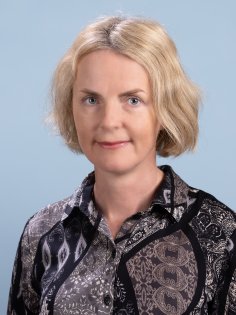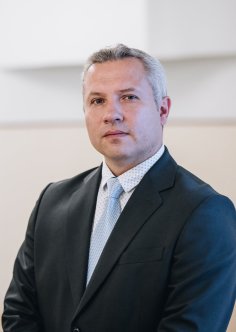The dean candidates of the Faculty of Social Sciences
The dean candidates of the Faculty of Social Sciences are Margit Keller, Associate Professor in Social Communication and Head of the University of Tartu Centre for Sustainable Development, and Janno Lahe, Professor of Tort Law and Acting Dean and Vice Dean for Academic Affairs of the Faculty of Social Sciences.
The dean candidates meet the staff and students of the faculty on 27 September at 15:15 (Delta, Narva mnt 18–1018). Participate in the meeting or watch it live on UTTV.
Ask questions from the dean candidates via the web form by 25 September.

Margit Keller
Associate Professor in Social Communication and Head of the University of Tartu Centre for Sustainable Development
Margit Keller was submitted by two groups of academic staff members, one group including 13 and the other 12 members.
I agreed to run as a candidate at my colleagues' suggestion to provide a fresh perspective and encourage debate on the development of the faculty. Social scientists have the unique ability to understand current social challenges and rapid changes. Our researchers are at the top in the world: absolutely all the main disciplines of our faculty are represented in the Times Higher Education or QS rankings in 2023 and ranked in the 200–300 band. This is a result to be proud of. We also have the highest number of students at the university. So there is a massive demand for social sciences in society, and our faculty has a strong capacity to satisfy it. However, we need to do it smartly, valuing the time and contribution of each student, teaching staff member, and researcher.
Our faculty has grown rapidly in recent years in terms of both the number of students and staff and the budget. In this situation, we must try to keep the quality, the strong position and every single person, and ensure the next generation. The importance of interdisciplinary trust and cooperation is growing to help us find solutions to urgent societal problems that transcend disciplinary boundaries.
My goal as a leader is to find a way how the autonomy of each unit, solidarity in the faculty and the development of the entire university can complement one another. The dean represents the interests of social sciences. Still, as a member of the Rector’s Office of the University of Tartu, the dean has to be aware of the bigger picture, in which social sciences have a unique, equally recognised role. A consistent search for balance – following the principle “how to make it work so that everyone wins” rather than “as long as I do not lose” – will help avoid the so-called home blindness.
I have gained valuable experience from the six years as head of the Institute of Social Studies. With my team, I managed to steer the institute from a complicated situation onto a new path and bring it out of a financial slump. Over the past year, I have led a consortium of four UT faculties and two museums – the Centre for Sustainable Development – which has given important lessons and contacts for serving society, research communication and university-wide collaboration. I believe that as a dean, I can do even more to promote sustainability at the university and in the faculty. From earlier years, I have five years of experience in chairing the international research network of the sociology of consumption. My research focuses on social change, which is helpful in practical management and highlighting the social sciences’ value and potential in society. I value teamwork, consistency, a sense of humour and an open mind for new solutions. The dean’s responsible position requires commitment, and I am ready for it.

Janno Lahe
Professor of Tort Law and Acting Dean and Vice Dean for Academic Affairs of the Faculty of Social Sciences
Janno Lahe was submitted by a group of 13 academic staff members and the council of the School of Law.
I have been the vice dean for academic affairs at the Faculty of Social Sciences since the beginning 2019. I will have held the office for five years at the end of this year. This time has given me fairly in-depth knowledge of the joys and sorrows of our faculty’s institutes, the university’s governance model, decision-making bodies and practices – in short, how the university operates. The knowledge is based, above all, on experience. The few weeks in the role of acting dean also give me the confidence to say that, in the dean’s office, I would not need an induction period and could immediately start standing up for the interests of the faculty and institutes. I agreed to be a candidate because I find it makes sense to use my knowledge and experience to the benefit of the faculty.
The second aspect is related to responsibility. I feel responsible for the well-being of the faculty. This is probably also the result of my work as the vice dean for academic affairs over nearly five years. As a dean, I would ensure that the faculty is stable, the dean’s decisions are predictable, and the faculty develops at a reasonable pace.
The faculty is facing various challenges that the new dean will need to address. Just to mention a few keywords: growth in the volume of teacher education, the distribution of research funding, sustainable development, cooperation with businesses, the low take-up of English-taught curricula, the development of colleges and, of course, salary policy. I am ready to address all these issues responsibly.
Last, I would like to note that you cannot apply to be a faculty dean yourself; the candidates are nominated by others. I would like to thank the council of the School of Law, my colleagues from the School of Law, the School of Economics and Business Administration, and the Johan Skytte Institute of Political Studies.


